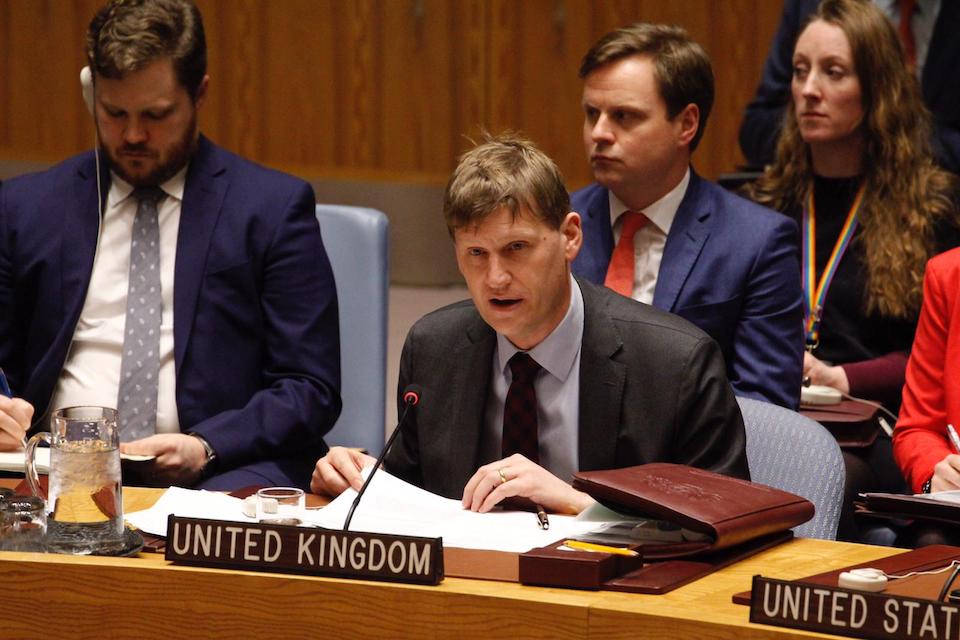Unacceptable conditions in Syria
Statement by Ambassador Jonathan Allen, UK Deputy Permanent Representative to the UN, at the Security Council Briefing on Syria

Thank you Mr President, and let me give thanks to the role of Kuwait of humanitarian co-penholders and by thanking Kuwait and Sweden for their outstanding efforts - especially the renewal in December of UNSCR 2449 on cross-border aid to Syria for another year. Let me also set out the United Kingdom’s full support for SRSG Pedersen and our ongoing belief that only a political solution based on Resolution 2254 of this Council can bring sustainable peace.
But Mr President today I’m going to focus my comments on humanitarian issues and let me take Under-Secretary-General Mark Lowcock’s four points as a guide.
So firstly in northwest Syria the United Kingdom is concerned about the growing presence of HTS and the implications of any increase in violence for the ongoing humanitarian response. We remain highly concerned for the 3 million vulnerable people in the area - over 2 million of whom are entirely reliant on cross-border aid. 50 per cent of the population of that area have been displaced from their homes - sometimes multiple times - stretching scarce resources beyond their limits and putting further strain on host communities.
Mr President, we must not lose sight of the risks. Under-Secretary-General Lowcock has spoken of a catastrophic humanitarian impact if a military intervention takes place. It is vital that the ceasefire negotiated by Russia and Turkey is maintained.
Mr President, the situation of the estimated 42,000 people in Rukhban remains of serious concern. Eight children have died there in the last month. Sustained humanitarian access is crucial. It is welcome to hear that verbal approvals have been given and security guarantees made. This must now be followed through on the ground and in reality. The second convoy is vital but it will not alone solve the problem. Our focus must be on ensuring quality access for the United Nations and its humanitarian partners. That means access for the UN to independently assess needs, deliver assistance and monitor the impact of that assistance. We urge the Syrian authorities and those with influence over them to ensure that this happens.
In 2018 the United Nations asked the Syrian authorities to undertake 1382 missions. Over half were never approved. We should all be able to agree that this is unacceptable.
Mr President, let me say that I agree with the Russian Ambassador’s comment that politicisation of humanitarian assistance is unacceptable. In that regard the United Kingdom is deeply concerned that conditions in former opposition-held areas that the regime now controls. Claims that life there has returned to normal are false. People there risk arbitrary detention, conscription and discrimination based on their perceived attitude towards the Assad regime. This is clearly not an environment for safe, dignified, voluntary refugee return - the conditions set out by UNHCR.
Up to one-third of people living in areas that have changed control in the past year are in so-called “hard to reach” areas. They are only hard to reach because the Syrian authorities do not allow the United Nations’ sustained humanitarian presence in those areas and thus humanitarian needs are particularly severe. Again this is unacceptable. The Syrian regime should not politicise humanitarian assistance. For our part, Mr President, the United Kingdom will continue to fund humanitarian assistance according to need - not any other criteria. Those funds from the United Kingdom have been distributed by the United Nations and their humanitarian partners all over Syria, as set out in the various documents and reports of OCHA and others.
The Syrian crisis has been the United Kingdom’s biggest ever humanitarian response. We have mobilised $3.5 billion of support since 2012, including a new commitment of over $450 million at the last pledging conference in Brussels.
Let me close Mr President by saying I agree entirely with the French Ambassador’s comments about reconstruction.
Thank you very much, Mr President.